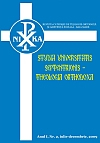Sfântul Diadoh al Foticeei şi autenticitatea operei sale -Viziunea
St. Diadochos of Photice
and the authenticity of his work –The Vision
Author(s): Adrian Gheorghe PaulSubject(s): Theology and Religion
Published by: Editura U. T. Press
Keywords: Diadochus of Photice; works Vision; autenticity works; the imago of man; man’s deification; the incarnation of Christ
Summary/Abstract: The biblical teaching on man’s creation according to the image and likeness of God has the central point in the history of Christian anthropology. Diadochus of Photice uses this teaching in his writings: „All men are made God’s image” und attributes the image of God to the whole human grace. In other words, he believes that the image is universal: it belongs to every man. By the creation of man in God’s image Diadochus recognises a primordial correspondence between the being of man and the being of God. Diadochus discerns the idea of a movement by man from the imago to the archetype in the phrase of Genesis „καθ’ όμοίωσιν”. Phrase of Genesis 1,26 constitutes for Diadochus and the majotity of the Fathers the biblical basis an which they developed their dogmatic teaching about man. According to Diadochus the likeness to God follows certain stages: is in so far as possible to be like God, and that means becoming like the divine as far as we can. The likeness to God is the deification of man as the last stage of man’s transfiguration in Christ.According to „works Vision” of Diadochus, the Word of God took a human body, density of nature and thus the incorporeal took shape. In the person of Christ, divinity and humanity are united. The incarnation took place in order that, through the Logos’ communion with man, the inclination of evil could be destroyed and mankind restored as it was before the fall. Through the incarnation of Christ the fundamental purpose of man’s existence has been achieved, that is man’s deification. With Christ human and divine nature began to be together so that by fellowschip with divinity human nature might become divine, not only in Christ Himself, but also in all those who believe and live according to His commandaments. God become man in order that man might become God in Him!
Journal: Studia Universitatis Septentrionis. Theologia Orthodoxa
- Issue Year: VII/2015
- Issue No: 2
- Page Range: 75-96
- Page Count: 22
- Language: Romany

